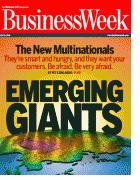In this week’s cover story, Emerging Giants, Business Week explores the phenomenon of multinationals emerging form the developing nations competing with the traditional western multinationals. The article says,"A new breed of ambitious multinational is rising on the world scene, presenting both challenges and opportunities for established global players.These new contenders hail from seemingly unlikely places, developing nations such as Brazil, China, India, Russia, and even Egypt and South Africa. 
They are shaking up entire industries, from farm equipment and refrigerators to aircraft and telecom services, and changing the rules of global competition". John Seely Brown and John Hagel suggests that if western enterprises are not participating in the mass-market segment of emerging economies, they are not developing the capabilities needed to compete back home. They called it innovation blowback - referring to the phenomenon that businesses from the developing world that expand into overseas markets and go head-to-head with established multi-national corporations. The duo had been recommending that by targeting the specific and demanding needs of lower-income consumers, Western companies can address a far bigger emerging-market opportunity and create the ability to take innovative products and services from the emerging world and use them in new categories at home.
C.K.Prahalad had been repeatedly talking about the different nature of innovation happening in the emerging economies. Look at what happens when good corporations first begin to work in the more challenging emerging economies : they get seasoned enough to become to be more adaptable and, consequently, more fit and ready to thrive in the hyper competitive global marketplace. "Hardscrabble origins", as Business Week writes, "can be a vital source of strength. These companies have learned to make money by developing reliable, easy-to-use goods and services at very low prices."
To get an idea of the distribution of such enterprises – look at the fortune list of Top cities where Global 500 corporations are headquartered. Many people make snide remarks about asian headquartered companies making more margins than western corporations – the article provides the reason –"Unlike Japanese and Korean conglomerates, which benefited from protection and big profits at home before they took on the world, these are mostly companies that have prevailed in brutally competitive domestic markets, where local companies have to duke it out with homegrown rivals and Western multinationals every day. As a result, these emerging champions must make profits at price levels unheard of in the U.S. or Europe". Without any more words, I recommend reading the full article here.
Category :Globalization, Emerging Trends
|

